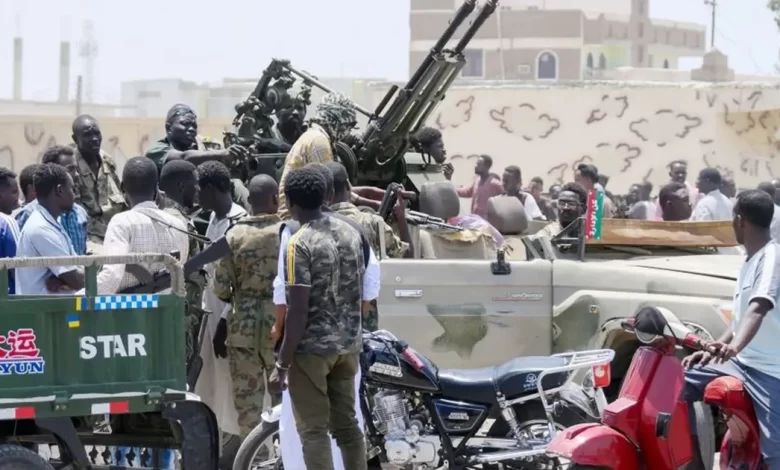Psychological Warfare… Methods Exposed to the Army and the People

Sudan Events – Abdul Basset Idris
For more than a year, soldiers of the army and the security system have been fighting fierce battles on many fronts, facing the invaders, with raised rifles, bare chests, bare feet, and empty stomachs except for a little extra food and water to help them stay on their feet and stand firm. What is the effect of psychological warfare on them and its impact on the course of the war?
Fire sources:
With the continuation of military operations and the expansion of the scope of violations of militia accusations against safe villages, and with the expansion of the army’s control over the scope of operations, a new war has begun, which experts believe is the most dangerous, as events are used to serve the enemy’s agenda through psychological warfare, and the army’s supporters become confused by manipulating the situation. The positions of the leaders and the questioning of the battle plans and strategies carried out by the soldiers. Major General (M) Adel Al-Tayeb explains to (Sudan Events) the dimensions of psychological warfare by saying: It has now begun through many means, but its goal is one, which is to build a collective mind that doubts the army and its capabilities to empty any popular support from the army. around it. Major General Al-Tayeb believes that the popular support for the army as it fights these battles had the greatest impact in aborting Hemedti’s adventure of seizing control of the country. He warns that psychological warfare is now being launched by specialized experts who exploit many people’s ignorance of the rules of war and the management of its operations and plans. Major General Adel is concerned about the effects of being drawn into psychological warfare and its effects on destroying the morale of soldiers.
The long walk:
The conversations of the Commander-in-Chief of the Army and the leaders of the various divisions reveal that the Armed Forces will fight a long battle that begins with the liberation of the capital and Gezira , and will not stop in Darfur. Given the reality, the Army’s war and its endeavor to nullify the plan to swallow the country did not begin on April 15 of last year, but it began from the moment the revolution and the project of change were hijacked after 2019.
With the army’s announcement of turning the page on the Bashir era, the picture at that time seemed simpler and clearer. The military component negotiated with national civil forces that represented the revolutionary alternative to leading the transition, revealing to everyone the entry of new players into the arena supported by an international incubator (Hamdouk, Abdul Bari and their comrades). Here the army agreed to a strange deal, and showed a wealth of expertise and exceptional capabilities in “conflict management.” It used the theory of “multiple transitions.” Its ability was evident in general exhaustion, absorption, and maneuvering, and it used its traditional combat method of sweeping and concentrating after each stage.
The Army used the papers and relationships in its hand and worked to reduce the plan to engulf the country and reduce the risks to a minimum.
New box
In the first transition, completed the removal of Sudan from the terrorist list, moved the relationship with America to a new square, and tore down the prohibitions on normalization with Israel. I believe that he is still negotiating with it in a way that does not prejudice its strategy and basic goals, and in that the army may be deeply aware that Israel views its current leadership as an interim ally. “Tel Aviv’s main allies are those who are popularly called the ‘sons of the forum’ and those who led the wars of the parties.”
In the second transition, they facilitated the process of communicating with international financial institutions, which brought Sudan’s debts to the point of decision-making.
This settlement may have been intended by the army to be acceptable and controlled through national activity that would extract its benefits and avoid its risks, with the main parties in the conflict and among the forces that continued to drive events from behind the stage and which were made up of what some call a group of joint “global” and “regional” capital that they want to work in the country (projects and investments).
But it seems that such capital parties are the ones behind the agitation for restructuring the regular forces, meaning that they are looking for a “gun” that will protect their interests and not threaten their future projects in Sudan, and they are waving the “chaos game” card. In fact, these groups have a complex work network in the productive, financial, and civil service sectors in a way that enables them to paralyze the state!
Upon discovering that it had lost the battle in exchange for the professional work of the security and military system, and after the failure of an attempt to bring an international mission under Chapter Seven, these groups resorted to activating Plan B by playing on the security contradictions and worked to employ Hemedti’s rifle and kidnap it, to control the entire country.
Technical calculations
Based on this, it appears that Sudan is now waging a multi-front war that appears to be greater than losing a military battle in a specific geographical area that is often subject to purely military technical estimates and calculations. However, it may not be a gateway to submitting to psychological warfare methods without a comprehensive view of the course of the war in its broad sense.



